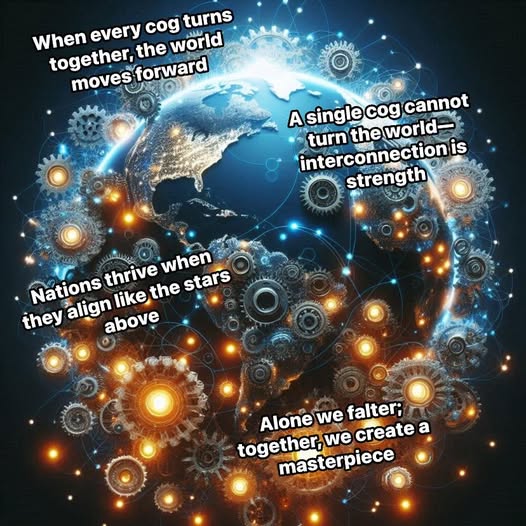
In a world suspended between the heavens and the earth, there lay a kingdom called Mechara, where everything operated on intricate systems of cogwheels. From the simplest watermill to the grandest tower clock, every device depended on the seamless interconnection of gears, large and small. The people of Mechara were well-versed in the art of synchronization, and they revered their Great Clockmaker, who had imparted the wisdom of harmony and balance.
Among the inhabitants, there was a curious young apprentice named Arin. He was fascinated by the machinery that powered the kingdom but often grew impatient with the need for collaboration. “Why must we rely on others?” he often mused. “Surely, one cog can spin faster and achieve more without waiting for another.”
One fateful day, Arin decided to put his theory to the test. In the town square stood the Grand Chronosphere, a magnificent clock that regulated the kingdom’s daily rhythms. Believing he could improve its efficiency, Arin secretly tampered with its gears, isolating one cog to spin independently. At first, the clock seemed to tick faster, and Arin was elated. But soon, the entire mechanism jammed, halting the flow of time in Mechara. Crops withered in the fields, trade came to a standstill, and the once-harmonious kingdom descended into chaos.
In his despair, Arin sought the guidance of an old watchmaker, Master Eron. The elder spoke with a voice as steady as the ticking of a well-oiled clock. “Arin,” he said, “a single cogwheel cannot carry the weight of the world. It is not speed but synchronization that holds the key to success. Each cog must move in harmony with the others, just as each star in the heavens follows its ordained path.”
Taking Eron’s words to heart, Arin worked tirelessly to restore the Grand Chronosphere, ensuring each cog was aligned and interdependent. When the clock finally chimed again, the kingdom breathed a collective sigh of relief. Arin had learned a valuable lesson: no success, whether mechanical or human, could be achieved in isolation.
The Celestial Lesson
Meanwhile, far above Mechara, in the vast expanse of the cosmos, a celestial council convened. The stars and planets, bound by ancient laws of gravitational harmony, watched with concern as the kingdoms of Earth grew increasingly fragmented.
One star, Luminara, proposed a bold solution. “Let us descend to Earth,” she said, “and teach the mortals the dance of the heavens. They must learn that their fates are interwoven, much like our orbits.”
The celestial beings chose a time when the world’s leaders were embroiled in fierce disputes over land, resources, and power. They appeared in shimmering forms at the United Council of Nations, casting their radiant light over the assembly.
“Mortals,” Luminara began, her voice resonating like the hum of the universe, “you quarrel over boundaries drawn by your hands, forgetting that the Earth belongs to all who dwell upon it. Like the stars above, you must find balance and alignment, for no nation can thrive in isolation.”
The celestial beings demonstrated their cosmic dance, showing how even the smallest star played a vital role in the universe’s stability. Inspired, the leaders began to see their disputes in a new light. They agreed to collaborate on shared goals, acknowledging that their individual successes were tied to the collective well-being of all nations.
A Symphony of Unity
The transformation extended beyond politics. Nations, like players in a grand orchestra, started synchronizing their efforts to address global challenges. Each country contributed its strengths—technology from one, natural resources from another, wisdom from yet another. They appointed a “Conductor of Unity,” a symbolic role to guide the harmonious collaboration.
The Earth began to thrive as never before. Poverty diminished, wars ceased, and the environment flourished under the collective stewardship of humanity. The celestial beings returned to their orbits, satisfied that their lesson had been understood.
As for Arin, he became a celebrated inventor in Mechara, often recounting his tale of the cogwheels and the celestial dance. “Success,” he would say, “whether in a single machine or the grand orchestra of nations, lies in recognizing our interdependence. Alone, we are but cogs; together, we create a symphony.”
And so, the world spun on, each cog and star playing its part in the eternal ballet of existence.

